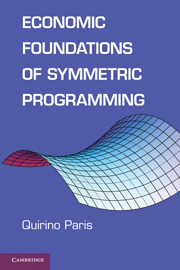Book contents
- Frontmatter
- Contents
- Foreword
- Preface
- 1 Introduction
- 2 Lagrangean Theory
- 3 Karush-Kuhn-Tucker Theory
- 4 Solving Systems of Linear Equations
- 5 Asymmetric and Symmetric Quadratic Programming
- 6 Linear Complementarity Problem
- 7 The Price Taker
- 8 The Monopolist
- 9 The Monopsonist
- 10 Risk Programming
- 11 Comparative Statics and Parametric Programming
- 12 General Market Equilibrium
- 13 Two-Person Zero- and Non-Zero-Sum Games
- 14 Positive Mathematical Programming
- 15 Multiple Optimal Solutions
- 16 Lemke Complementary Pivot Algorithm User Manual
- 17 Lemke Fortran 77 Program
- Index
2 - Lagrangean Theory
Published online by Cambridge University Press: 05 June 2012
- Frontmatter
- Contents
- Foreword
- Preface
- 1 Introduction
- 2 Lagrangean Theory
- 3 Karush-Kuhn-Tucker Theory
- 4 Solving Systems of Linear Equations
- 5 Asymmetric and Symmetric Quadratic Programming
- 6 Linear Complementarity Problem
- 7 The Price Taker
- 8 The Monopolist
- 9 The Monopsonist
- 10 Risk Programming
- 11 Comparative Statics and Parametric Programming
- 12 General Market Equilibrium
- 13 Two-Person Zero- and Non-Zero-Sum Games
- 14 Positive Mathematical Programming
- 15 Multiple Optimal Solutions
- 16 Lemke Complementary Pivot Algorithm User Manual
- 17 Lemke Fortran 77 Program
- Index
Summary
The purpose of this chapter is to outline an overview of the basic criteria for characterizing the solution of static optimization problems. Its intent is neither rigor nor generality but a sufficient understanding for the logic leading to the conditions of optimization and a sufficient degree of practicality. An immediate issue is whether we are satisfied with relative optima or require global optima as the solution of our problems. Any further elaboration necessitates a definition of these two notions.
Definition: A point x* ∈ Rn is a relative (or local) maximum point of a function f defined over Rn if there exists an ε > 0 such that f(x*) ≥ f(x) for all x ∈ Rn and |x - x*| < ε.
A point x* ∈ Rn is a strict relative (or local) maximumpoint of a function f defined over Rn if there exists an ε > 0 such that f(x*) > f(x) for all x ∈ Rn and |x - x*| < ε.
In general, we would like to deal with solution points that correspond to global optima.
Definition: A point x* ∈ Rn is a global maximum point of a function f defined over Rn if f (x*) ≥ f (x) for all x ∈ Rn.
Apoint x* ∈ Rn is a strict global maximum point of a function f defined over Rn if f (x*) > f (x) for all x ∈ Rn.
- Type
- Chapter
- Information
- Economic Foundations of Symmetric Programming , pp. 15 - 27Publisher: Cambridge University PressPrint publication year: 2010



